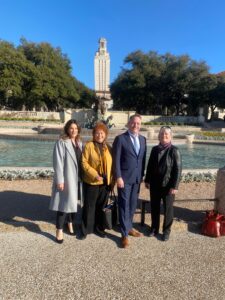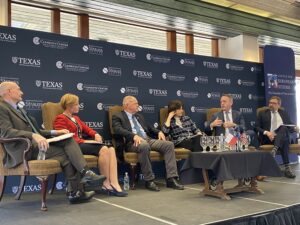
The North Atlantic Treaty was signed in Washington on April 4, 1949, establishing the North Atlantic Treaty Organization (NATO). Canada was a founding member of the Alliance and has remained as a member since its inception. NATO is a major contributor to international peace and security and a foundation of Canadian security and defence policy.
As NATO celebrates its 75th Anniversary, Canada’s priority is to ensure the Alliance remains modern, flexible, agile and able to face current and future threats. Within this context, Canada stands alongside the United States, as its neighbor and ally in recognizing that security and economic prosperity go hand-in-hand.
In February, the Consulate General of Canada in Dallas co-partnered with multiple research centers at the University of Texas-Austin (UT-A), NATO ACT, and The Atlantic Council to hold a public conference reflecting on the 75th anniversary of NATO. The event on the UT-A campus, “NATO and the Future of American Security”, brought together military officials, security and defence policymakers, and scholars in discussions on the role and evolution of the transatlantic alliance as the longest-lasting multilateral security partnership in recent history.
Canadian guest speakers Lieutenant-General (Lt.-Gen.) Christine Whitecross (retd), former 3-star Commandant of the NATO Defense College in Rome, and Kevin Rex, Canada’s former Ambassador to the Republic of Latvia, underscored how NATO is the cornerstone of Canada’s foreign defence policy, and is one of our most important relationships.


When asked about Canada’s commitment to maintaining and strengthening the transatlantic bond, Rex pointed out the unique nature of the NATO Field School and Simulation Program at Simon Fraser University in British Columbia, the only political science university program in the world to offer immersive and experiential training solely focused on all aspects of NATO. He also profiled Canada’s leadership of the NATO enhanced Forward Presence (eFP) multinational Battle Group in Latvia, where Canada has pledged to more than double its military presence by 2026. Rex emphasized Canada’s $13.3 billion in funding to support Ukraine, including $4 billion in military assistance, since February 2022, and NATO’s new Climate Change and Security Centre of Excellence (CCASCOE) based in Montreal as examples of Canada’s steadfast commitment to NATO.
On the modernization of the Alliance, Lt.-Gen. (retd) Whitecross elaborated on how Canada’s longstanding contributions to the Alliance’s collective defence, including training, has helped reinforce solidarity among Allies and partner nations. Whitecross referred to the modern battlefield of today as “not the battlefield of our grandparents”, explaining that through adaptability NATO has improved interoperability and provided opportunities for women. In the context of public concerns about ongoing relevance of NATO, she noted that NATO creates an environment of safety beyond the borders of NATO member states; when people are safe, cross-border migration decreases, which in turn helps reduce counterterrorism and human trafficking.
The audience also heard from two keynote speakers: NATO ACT Commander General Lavigne and former U.S. NATO Permanent Representative Kay Bailey Hutchison. Both speakers stressed how NATO continues to counter a vast array of threats by strengthening its deterrence and defence as the backbone of its commitment to collective defence; helps to prevent and manage crisis situations; and encourages cooperative security both in the United States, and abroad.
Continue to follow us this July, as Washington, DC hosts the NATO Summit to mark the Alliance’s milestone anniversary.